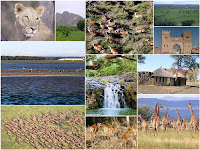Nairobi: still my favorite city?
 Yes, it still is! I love Nairobi. It is my most favorite city. Next to Al Mukalla. It's not only Nairobi's amazingly beautiful scenery; the all year round, very pleasant climate (ranging between 11°C to 25°); the large wildlife sanctuary on the city's outskirts; and it being my home, too - it is more than that. From the first instance I saw Nairobi, way back in 1972, when I was just a little boy and though I don't have much liking for cities and crowded places, I was captivated by the place. Even then, it seemed very crowded to me. But, the Nairobi that was then is a far cry from what the city has now become. Then: Nairobi had very neat, clean streets, many large parks around, an efficient infrastructure, efficient institutions and was comparatively very safe. And it had a much smaller population. And now?
Yes, it still is! I love Nairobi. It is my most favorite city. Next to Al Mukalla. It's not only Nairobi's amazingly beautiful scenery; the all year round, very pleasant climate (ranging between 11°C to 25°); the large wildlife sanctuary on the city's outskirts; and it being my home, too - it is more than that. From the first instance I saw Nairobi, way back in 1972, when I was just a little boy and though I don't have much liking for cities and crowded places, I was captivated by the place. Even then, it seemed very crowded to me. But, the Nairobi that was then is a far cry from what the city has now become. Then: Nairobi had very neat, clean streets, many large parks around, an efficient infrastructure, efficient institutions and was comparatively very safe. And it had a much smaller population. And now?Years of mismanagement, neglect and corruption has turned Nairobi in to a city with one of the highest crime rates in Africa: violent armed robberies, burglaries and carjackings are a common occurrence in the city. Institutions, including educational and health ones, have deteriorated. And the infrastructure that serves the city now, has crumbled or remained very much behind and stagnant - and not kept up pace with the city's rapid population growth. All these make Nairobi hard to like, now. A few excerpts from what is currently said about Nairobi; some bad and some good :
The incredible performance of the Nairobi Stock Exchange (NSE) - which is next to the public auditorium and provides the live share-price feed - is the talk of the country. From 2002 to 2007, the main NSE index rose 787% in dollar terms, according to Standard & Poor's, the investment research firm, making it one of the world's best-performing markets. Guardian Unlimited
The noose is tightening by the day. And Nairobi is moving closer to a gridlock with experts saying that the traffic congestion in the city is well into what is considered severe by international standards. AllAfrica
This is the tension that best defines Nairobi: to try (and often fail) to live within the world-views of our traditional nations; to try (and often fail) to be seamless, Western-educated people; to try (and often fail) to be Kenyans—still a new and bewildering idea. National Geographic
Kenya's capital city has some of the most dense, unsanitary and insecure slums in the world. Almost half of the city's population lives in slums. It is estimated that in Nairobi there are about 200 slums and squatter settlements. UN-Habitat
Nairobians might be pleasantly surprised to learn that their city has been rated as among the 200 best cities in the world. The list of 200 cities, selected by the staff, authors and readers of the Lonely Planet travel guide, is not scientific or based on any measurable quality of life index, but is based on qualities that are hard to measure, such as a city's "personality" and its "human architecture". AllAfrica
Whatever might be said about Nairobi, one thing is certain: it evokes passionate memories. I find Nairobi to be an excellent place, not only to visit, but to live or/and work in. It has one of the friendliest of people and is one of the most cosmopolitan of places, with people of different races, religions and cultures living peacefully side by side. And which other city in the world has a large game park just ten or so kilometers away from the city center, where rhinos, lions, cheetahs and many other wild animals, freely roam? Only in Nairobi!
Photo: National Geographic
Nairobi On: Google Video


